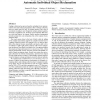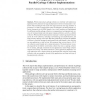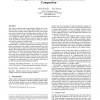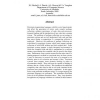386 search results - page 20 / 78 » Garbage collection for embedded systems |
PLDI
2006
ACM
14 years 1 months ago
2006
ACM
Garbage collection has proven benefits, including fewer memoryrelated errors and reduced programmer effort. Garbage collection, however, trades space for time. It reclaims memory...
LCPC
2001
Springer
14 years 5 days ago
2001
Springer
While uniprocessor garbage collection is relatively well understood, experience with collectors for large multiprocessor servers is limited and it is unknown which techniques best ...
ASPDAC
2009
ACM
13 years 8 months ago
2009
ACM
Efficient data indexing is significant to embedded devices, because both CPU cycles and energy are very precious resources. Soft lists, a new index structure for embedded devices w...
PLDI
2006
ACM
14 years 1 months ago
2006
ACM
The widely used Mark-and-Sweep garbage collector has a drawback in that it does not move objects during collection. As a result, large long-running realistic applications, such as...
POS
1994
Springer
13 years 11 months ago
1994
Springer
Persistent programming languages exhibit several requirements that affect the generation of native code, namely: garbage collection; arbitrary persistence of code, data and proces...




